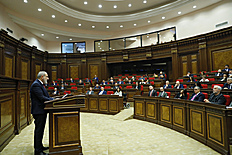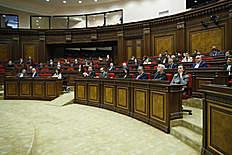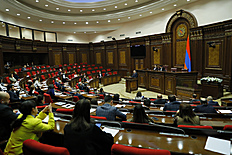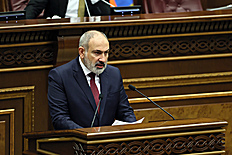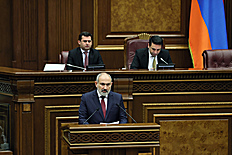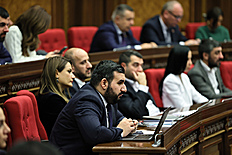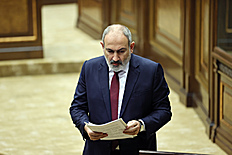Statements and messages of the Prime Minister of RA
In the Republic of Armenia, everyone is equal before the law, and this is the political will of the Government, the parliamentary majority and myself. Prime Minister
more 4 photos
Prime Minister Nikol Pashinyan made a final speech at the discussions of the state budget bill for 2024 in the National Assembly, in which he specifically stated:
"Honorable President of the National Assembly,
Dear Cabinet members,
Dear MPs,
Dear attendees,
Dear people,
In the previous stages of the discussion of the state budget bill for 2024, I referred to the developments taking place in a number of strategic directions. Today I want to touch on justice, the strategic importance of which cannot be overestimated.
The biggest expectation of the people who implemented the popular, non-violent, velvet revolution of 2018 was justice, the elimination of corruption from the Republic of Armenia. I have to report with pain that these expectations remain in place, which means that they have not been realized, at least in full.
But what does this mean, why have these expectations not been rmet, does it mean that the government has betrayed the principles and values of the revolution? Strange as it may seem, before answering this question, one must first answer another question: what is justice, rule of law, how is it expressed or how should it be expressed?
After the popular, non-violent, velvet revolution of 2018, many expected that revolutionary justice would take place, that is, verdicts would be made and carried out in the public squares, including the confiscation of property, and even the punishment of specific individuals in specific ways, something that was called terror during the French Revolution. But we did not go that way for a simple reason: we did not carry out a revolution like the October Socialist Revolution, but a revolution of love and solidarity and promised that there would be no vendettas in Armenia.
This is an important nuance, because both justice and not adopting vendetta practices is our revolutionary obligation to the people. And a natural question arises: how were we and are we going to implement that, the two obligations may seem contradictory: not to carry out vendettas and to establish justice in the country.
It is here that the seemingly simple question at first glance acquires key significance: what is justice, how and where is justice determined?
Our approach has been and continues to be the same: justice is determined in institutions that have the authority to administer justice, establish justice and act on the basis of the law and the Constitution. We can say that justice is an institutional phenomenon, and my belief was and remains that what is not institutional is not and cannot be justice. Otherwise, one may consider shooting another at the building entrance a just action, the second to break another's jaw, the third to take a stake in another's business, the fourth to usurp someone else’s property. Not only can this not be justice, even if it is considered fair in public opinion, it is also a direct way to undermine the state and statehood, the highest result of the lack of will to have a state.
Honorable President of the National Assembly,
Dear Cabinet members,
Dear MPs,
Dear attendees,
Dear people,
Justice is an institutional phenomenon. What is not institutional, is not and cannot be justice. But this is where the next important question arises: has the government done anything or what is it doing to establish deep institutional justice and rule of law in Armenia?
The answer to this question is also provided by the state budget of the Republic of Armenia.
Compared to 2018, in 2023 the funding of the judicial system has doubled. In 2024, this trend will become more pronounced. The salary of judges of the Court of Cassation has increased significantly on top of the already high base. And the salaries of judges of the Court of Appeal and the Court of First Instance will increase from January 1, 2024. Funding for the prosecution has more than doubled in 2023 compared to 2018, and this situation will be further accentuated in 2024. Prosecutors' salaries have almost doubled. Investigative Committee funding increased by 256 percent in 2023 compared to 2018. The salary of investigators of the Investigative Committee has almost doubled. In 2023, funding for the Anti-Corruption Committee increased by 443 percent compared to 2018.
Investigators' salaries have increased substantially on top of an already high base, and operative officers are receiving unheard-of salaries. The salaries of judges of the Constitutional Court have almost doubled, the financing of the Constitutional Court has increased significantly. All these decisions were made by the government, the parliamentary majority, and we made these decisions believing in the ideals of the institutional essence of justice and the essence of the judicial system. Speaking at the Cabinet meetings regarding these decisions, I announced that we are increasing salaries not so much for judges, prosecutors, and investigators as for citizens, because judges, prosecutors, and investigators provide services to citizens, people, and the public. It is they who must implement institutional justice and fairness. I believe and see that great efforts are being made, but the citizens of the Republic of Armenia still do not have a sense of justice and the inevitability of justice, and this is a serious problem, but more importantly, this perception of the public has deep and objective reasons. That is, the lack of that perception.
I have already spoken publicly about some of them, but I must repeat that, for example, the scenes of the arrests of suspects with noise and shouting, with masks and guns, and then the fact that in a few days people see those same suspects enjoying coffee in cafes produces cognitive dissonance in the public consciousness. It’s not so that whoever was arrested should no longer be released. But my perception is that when covering their activities, investigative and operational agencies should start relying more on verdicts than on preliminary actions, the judicial outcome of which no one knows.
When reporting to the Government, the National Assembly, and the public, investigative bodies and the prosecutor's office should not rely on the statistics of how many cases were initiated or sent to court, but on how many verdicts were made, because the current methodology of statistics gives a good idea of the actions, but gives no idea of the results. I will suggest to our partners in the National Assembly and the government that changes be made in the relevant regulations to define this logic in the reports submitted to the Government and the National Assembly, because this is what should show the quality and depth of the work of our investigative bodies, prosecutor's office, and courts.
This is what that should answer the question whether there is justice and rule of law in the country or not. On the other hand, we have deep problems in the judicial system. Sometimes it seems that trials can last forever and this is no exaggeration. There are lawyers who assess this as an abuse of judicial rights, and since the delays happen at the initiative of the defendants, another group of lawyers say that it is a matter of the exercise of human rights, and imposing restrictions here will have a negative impact on the protection of human rights.
But on the other hand, the question arises: the victims are humans, aren’t they? Who should protect their interests and rights? Doesn't the public, which has the right to know the truth in many cases, consist of humans, or will the unnecessary delays of trials increase the feeling of protection of people in the Republic of Armenia or vice versa? I think, vice versa. And as someone who initiated the 2019 court blockade, this is a bitter note for me. At that time, many tried to present the action as an attempt to obstruct justice. In fact, we closed the doors of the court for a few hours to open the doors of justice. But I must record that the doors of justice are not yet fully opened, not sufficiently opened. What should be done then?
My belief remains that what we must do is to implement institutional reforms. We must keep alive the public demand for justice and rule of law, against all odds, we must keep our faith in the ideal of an independent judiciary. The role of the National Assembly is essential in this process. Only those candidates who believe in justice and rule of law, independent judiciary and possess the proper degree of integrity should be elected to the judiciary.
After 5 years of reforms, we are finally seeing some activity in illegal asset confiscation cases, and these cases are being investigated in the newly formed anti-corruption courts. As you know, after the revolution, we formed 3-instance anti-corruption courts with high salaries for judges. Moreover, we are approaching European standards with the salaries of the judicial system. Significant steps are being taken to ease the burden on the courts. Since 2018, 60 new positions of judges have been added in Armenia, and many other reforms have been implemented. Now, enforcement of arbitration decisions in cases of confiscation of small sums of up to 5 million AMD will be carried out without putting burden on the courts. A package was adopted, according to which, during the last two years before the expiry of the judge's term of office, the given judge will hear only cases of issuance of a payment order and simplified proceedings, in order to relieve the burden of other judges and not to have unfinished and transferred cases, which under our legislation start from scratch.
In administrative, civil, and bankruptcy proceedings, most cases will be heard by written procedure, quickly and efficiently, without conducting hearings for minor cases. The function of returning the application and attached documents in technical cases has been assigned to the judicial clerks, which will speed up the correction of errors in the documents and initiation of proper claims. It is planned to free the courts from obviously unreasonable questions, get the Civil Court of Appeals rid of small money cases, carry out court notifications using telephone or Internet connection, for example by sending a message, completely digitize the civil and administrative proceedings. These are steps that will allow our courts to spend as little time as possible on technical work and focus on the task of ensuring justice and rule of law. And as a result, the citizen of the Republic of Armenia should be confident that if injustice has happened to him, he surely has the opportunity to restore justice through state institutions, and this feeling is essential from the point of view of the interests of our state, the development of the Republic of Armenia.
Dear attendees,
Dear people,
In this sense, the rumors among the public about the activation of corruption phenomena are disturbing, which are substantiated by a number of specific findings. But I must also record that, among others, protracted trials and the lack of perception of the inevitability of punishment create fertile ground for the activation of corruption phenomena. However, the government and the parliamentary majority have a key role in the anti-corruption fight, which must continue the work of introducing the most serious mechanisms for the fight against corruption and its prevention. I want to emphasize once again that after 2018 completely new institutions of anti-corruption policy were introduced in the Republic of Armenia. For example, the Corruption Prevention Commission, the funding of which increased by 443 percent compared to 2018. In 2024, this indicator will become 566 percent. New declaration and good conduct systems have been introduced and are under development and this work should continue.
I have already talked about the formation of the Anti-Corruption Committee, I also talked about the need to review the work methods of the Anti-Corruption Committee and increase the efficiency of its work. One thing is obvious and I want to state this once again: there are no untouchable people in the Republic of Armenia, all people are equal before the law, and this is the political will of the Government, the parliamentary majority and myself. But in order to realize this political will, it is necessary to create proper structures, to continue this process, so that the subjective perceptions of the investigator, prosecutor, and judge do not have either a negative or a positive effect on the course and outcome of criminal cases. My feeling is that we have not yet managed to create such a situation, and as trivial as it sounds, the solution to this problem is also related to the change in thinking, the change we have been talking about lately within the framework of the concept of "motherland is a state".
Motherland is the state.
If you love your motherland, be law-abiding.
Motherland is the state.
If you love your motherland, then report the crime.
Motherland is the state.
If you love your motherland, don't take bribes,
Motherland is the state.
If you love your motherland, don't steal.
Motherland is the state.
If you love your motherland, don't falsify.
Motherland is the state.
If you love your motherland, don't give bribe.
Honorable President of the National Assembly,
Dear Cabinet members,
Dear MPs,
Dear attendees,
Dear people,
I think that in the last five years, the ruling majority has made enough reforms, including personnel solutions, to have the right to expect that justice and rule of law will be established as cornerstone institutions in the Republic of Armenia, and therefore the ball is now in the court of institutions that implement justice and rule of law.
The state budget 2024 continues the process of strengthening justice and rule of law as an institution in Armenia. Also for this reason, I urge to vote in favor of the state budget bill. Thank you".
